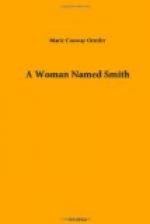Mary Magdalen and Beautiful Dog always departed after dinner. Except for the Black family and the two canaries, Alicia and I had big, lonesome Hynds House to ourselves. Mr. Jelnik’s gray cottage, set amid Lombardy poplars and thick shrubberies, was some distance away, and we didn’t know whether Doctor Geddes was at home or not. It is true we had firearms, a pair of pistols having been literally forced upon us by the doctor, who fretted and fumed about our staying there alone. Both of us were more afraid of those pistols than of any possible ghostly intruder.
Nevertheless, I went up-stairs and fetched them. Alicia took one as she might have taken a rattlesnake, and I held the other. Armed thus, carrying torch-light and lantern, and with the two gray-faced, half-clad negro women following us, one carrying our brass poker and the other the tongs, we marched upon the carriage house.
The big barnlike place, lately cleaned and whitewashed, looked painfully empty. In one of the stalls the hay purchased for our recently acquired Jersey cow gave off a pleasant odor. Over in one corner, in a neat, clean, orderly array, were Schmetz’s tools. A little farther on was our chicken feed, in covered barrels.
We went from empty stall to empty stall, to reassure the women; there wasn’t so much as a cobweb in any of them. All the down-stairs windows were heavily barred with iron and further protected, like the doors, with heavy oaken shutters studded with iron nail-heads. The two small rooms in the rear had once been used as a jail for recalcitrant slaves; they held now nothing deadlier than Schmetz’s flower pots and seedlings. Every shutter was closed, and the iron bars looked reassuringly strong; also, the walls are three feet thick.
“You were dreaming, you silly women! I told you you were dreaming!” said I, and had turned to go, reassured and relieved, when Alicia’s nose wrinkled. I could hardly keep from sniffing, myself.
In the carriage-house was a faint, indeterminable scent, the ghost of the ghost of fragrance, so elusive that one sensed rather than smelled it, so pervasive and haunting that one could not miss it. And it certainly had nothing to do with the wholesome odor of hay and cow feed, or the smell of whitewash and oiled tools.
“Yes, you were dreaming.” Alicia began to edge the colored women toward the doors. “But as you’ve had a scare,” she added pleasantly, “I’ll give you a new lace collar, Queenasheeba, and you a red ribbon, Fernolia, to wear to church next Sunday, just to prove to you that being awake is heaps better than having nightmares.”
We padlocked the big doors after us, and went through the rooms up-stairs. They, too, had been freshly cleaned and calcimined. And they, too, were quite empty.
Despite which, Fernolia and Queenasheeba were firmly, tearfully, shiveringly certain they had seen nothing less than ol’ Mis’ Scarlett’s ha’nt. They had the worst possible opinion of ol’ Miss Scarlett: she had been bad enough living—but as a spook! We had to let them lug their bedding over and sleep in the room next to ours; we had to give them sweet lavender to quiet their nerves. I am sure they would have bolted incontinently if they hadn’t been too scared to venture outside.




